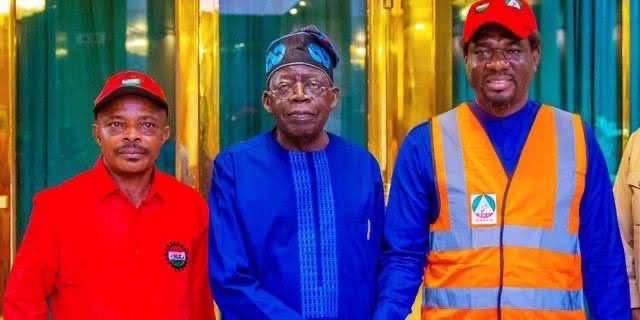…To support Labour with 36 CNG buses to ease workers’ cost of living
…We can’t pay N70,000 without Govt support – Private sector
By Sodiq Adelakun
The Federal Government and labour unions have reached an agreement on a new minimum wage of N70,000 for Nigerian workers.
This comes after prolonged negotiations between both parties, which had previously been deadlocked over the issue.
President Bola Tinubu has also vowed to review the national minimum wage law every three years, providing a guarantee for future adjustments.
This decision was announced during a meeting with leaders of the Nigeria Labour Congress (NLC) and Trade Union Congress (TUC) at the presidential villa in Abuja.
Also, in the meeting, President Bola Tinubu committed to providing 36 Compressed Natural Gas (CNG) buses to the Nigeria Labour Congress (NLC) and Trade Union Congress (TUC).
This initiative is part of the Federal Government’s efforts to mitigate the high cost of living for workers across the country.
Each of the promised CNG buses will have a seating capacity of 100, aiming to provide significant relief to workers by offering more affordable and sustainable transportation options.
Recall that there have been negotiations between the federal government and organised labour regarding the new minimum wage.
Initially, the federal government proposed a sum of N62,000, but labour insisted on N250,000, resulting in a deadlock between both parties. However, after meeting again with the president, and both parties engaged in an hour-long discussion on the topic, both parties finally decided to agree on a N70,000 minimum wage.
A statement by the Special Adviser to President Bola Tinubu on Information and Strategy, Bayo Onanuga, confirmed the approval on Thursday.
According to the statement, President Tinubu announced the new minimum wage during a meeting with leaders of the Nigeria Labour Congress (NLC) and Trade Union Congress (TUC) at the presidential villa in Abuja.
The President of NLC, Joe Ajaero, and President of TUC, Festus Osifo, were among those present, alongside relevant ministers of the federation.
Onanuga also said that the president confirmed he would soon review the four-month salary of the university union in the country.
“President Bola Tinubu has approved N70,000 minimum wage for Nigerian workers with a promise to review the national minimum wage law every three years.
“President Tinubu also promised to find ways to assist the private sector and the sub-nationals to pay the minimum wage.
“President Tinubu announced the decisions at the meeting held with leaders of TUC and NLC on Thursday in Abuja, the second time the parties met in 7 days.
“The Labour leaders applauded President Tinubu for the fatherly gesture as the President also promised to use his discretionary powers to meet the demands of university unions demanding unpaid 4 months salaries.
“As a way of ameliorating the high cost of living by workers, President Bola Tinubu has promised to give 36 CNG-powered buses with a sitting capacity of 100 each to the TUC and NLC.”
Initially, the federal government proposed a sum of N62,000, but labour insisted on N250,000, resulting in a deadlock between both parties.
In addition, the Minister of Information, Mohammed Idris, said the Organised Labour agreed on the proposal of N70,000 as the new minimum wage for Nigerian workers.
“We are pleased to announce today that both Organised Labour and the Federal Government have agreed to increase the minimum wage from N62,000 to N70,000,” Idris stated.
…We can’t pay N70,000 minimum wage without support — OPS warns FG
Meanwhile, the Organised Private Sector (OPS) has warned that its members cannot pay the N70,000 National Minimum Wage announced by the Federal Government without support. This comes after President Bola Tinubu approved the new national minimum wage, which has been a topic of discussion among stakeholders.
According to Spokesperson of OPS and Director General of the Nigeria Employers’ Consultative Association (NECA), Adewale-Smatt Oyerinde, “While we commend the President for putting to rest the immediate issue of the National Minimum Wage, we also note, most importantly, his commitment to support the sub-nationals and the Organized Private Sector to pay the new wage.”
The OPS’s warning comes at a crucial point in the discussion, as the new minimum wage is expected to impact businesses and workers across the country. The Federal Government’s support will be essential in ensuring a smooth implementation of the new wage, and the OPS is eager to see the details of this support.
As Oyerinde noted, “The OPS commends the President’s commitment, but the devil is in the details, and the OPS awaits further clarification on how this support will be provided.”

